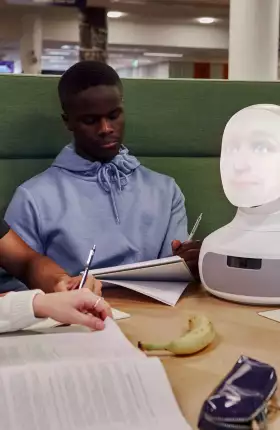Right now, the new academic year is in full swing in the US—and AI is already on the syllabus in some college classrooms.
At a time when AI is disrupting the future of work, universities are grappling with how to equip students for success in future workplaces that will demand a high level of comfort with AI and human-machine collaboration.
The So What
The most far-sighted institutions are thinking more broadly than adding AI majors or developing specialist AI research programs: they are working to embed AI tools and learning techniques through the whole curriculum.
That can mean using AI tools for statistical analysis for economics majors, or learning how AI can accelerate drug development for science majors. It also means incorporating AI into the learning process itself, for example, by asking AI to analyze gaps in a student’s knowledge and then generate new assignments to improve those areas.
“The change is happening now. The winners will be the institutions who are agile and innovative and take a bet on AI being the differentiator that enables them to stand out from the crowd,” explains Nithya Vaduganathan, a managing director and senior partner in BCG’s Boston office.
Universities should expect to invest upfront if they want to become known for having a first-class AI program. “Increased enrollment will likely only follow once new faculty and courses are in place,” adds Vaduganathan.
Now What
New expenditures are tough for the many US colleges that are constrained by resources and teaching capacity. Some also face declining enrollment, further increasing pressure on budgets. And, for all universities, there is also the issue of time: developing new curriculums is traditionally a lengthy process.
These are some of the levers that universities can consider as they manage resources and target their AI transformation.
Develop deeper industry partnerships. Many businesses are already partnering with universities.
- Microsoft, for example, is partnering with Mass General Brigham, a nonprofit health care system, and University of Wisconsin-Madison to further advance AI foundation models for medical imaging.
Universities should now seek to deepen partnerships to better understand future skills. The most fruitful partnerships will give universities the insights they need to work backwards from demand and reverse engineer their course offerings.
- In the semiconductor industry, for example, New York state is emerging as a hub for new factories that will require engineers to help create the chips that power AI. To ensure a strong pipeline of talent, one chip manufacturer is already offering internships for students and a professor fellowship program to increase faculty in quantum and chip technologies.
Harness AI’s potential for transformation. GenAI also provides solutions when looking for increased efficiency and the faster development of new courses. GenAI can help with course outlines, for example, or co-create video modules or tutorials. It is well-suited to synthesizing large volumes of information and research, further assisting in the content of courses. It could also automate some administrative tasks, help with assessment and feedback, or refine targeted marketing strategies to attract future students.
Foster new collaborations. Governments also have a strong interest in ensuring industry has the skilled workers they need to thrive. And it may be beneficial for employers, universities, and governments to collaborate.
- In Denver, Colorado, for example, the government is providing grants that are helping create an AI-supported talent pipeline for higher-level health care jobs. This includes helping future employees with tuition costs. Universities may then be able to use such research to create upskilling programs where there are gaps.
Peer-to-peer partnerships between colleges may also help, joining forces to understand employer needs. This could include exchange programs between universities and joint partnerships with employers.




